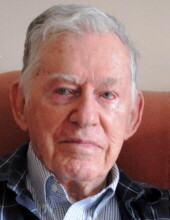

William B. Rotch
March 28, 1916 — February 1, 2017

Send a Gift
Past Services
Visitation
Funeral Service
Saturday, March 18, 2017
Starts at 2:00 pm (Eastern time)
William B. Rotch
William B. Rotch of Peterborough, N.H., a longtime resident of Milford, died Feb. 1, 2017, at RiverMead Retirement Community in Peterborough. He was 100 years old. He was married for 68 years to Martha (Patty) McLane Rotch, who died in 2008. Mr. Rotch is survived by his children, Peter B. Rotch and his wife, Susan; and Martha Rotch Manley and her husband, Frank, all of Peterborough; Elizabeth Rotch; and John M. Rotch and his wife, Jean, all of Milford; 12 grandchildren, Duncan Rotch, Heather Bradeen, Carolyn Bradley, Barbara Manley, David Manley, David Rotch, Michael Rotch, Matthew Rotch, Katherine Nicholas, Rebekah Rotch, Abigail Rotch and Daniel Rotch; and 12 great-grandchildren. A son, Malcolm E. Rotch, died in 1966. Mr. Rotch was born March 28, 1916, in Milford, N.H., the son of Arthur B. and Serena H. E. Rotch. His sister, Helen R. Ferguson, died in 1991. Mr. Rotch attended Milford schools (including the old Brick School, later to become the offices of The Cabinet Press). He has described his youth as “happy years. School dances in the town hall, long walks in the fields beside the river, Saturday lunches of hot dogs cooked over campfires in the abandoned quarries on Patch and Mayflower Hills.” He told of skirmishes with his young friends of the Highland Gang in the woods on Mayflower Hill, and the Souhegan Navy along the river, and of summers at Camp Belknap on Lake Winnipesaukee. He also had fond memories of spending time with his father at the family woodlot beside Route 13, where they planted, nurtured and trimmed thousands of pine trees, and for which he earned a state 4-H Forestry medal. The land is now the Rotch Preserve, part of the Milford Conservation Commission’s holdings. Mr. Rotch graduated from Dartmouth College in 1937, where he was active in the Dartmouth Outing Club. He described it this way: “There was always something interesting to do: canoeing on the Connecticut or the White River, week-ends at Ledyard Canoe Club cabins along the Connecticut, trails to be cleared on Mt. Moosilauke, expeditions to Mt. Washington and the Presidentials, trips to Lake Champlain, rock-climbing on Cannon Mountain or Joe English …” In the summer of 1936, he and a friend went to Europe. Years later he wrote “… I look back on the few days I spent in Germany with some disbelief. It was the summer of the Olympics. Sam Dix and I, both students at Dartmouth, had reached Norway on a Norwegian freighter, and then on to Germany by bicycle. Sam was an Eagle Scout. This was important, because (we gathered) that the Nazi party was trying to identify the Hitler Youth movement with the Boy Scouts. Sam’s Scout uniform was our entrée. We were welcomed to Berlin, and a couple of Hitler Jugend were assigned to look after us. We slept and ate at the Hitler Youth headquarters, and when we wanted to go anywhere just told our guides in their Nazi uniforms, then we all mounted motorcycles and off we went. Our guides steered their motorcycles with one hand, saluting “Heil, Hitler” with the other. After a couple of days … we all said goodbye in English and German. We thanked them, mounted our bicycles and pedaled off to Denmark and Norway.” The next summer Mr. Rotch spent with the Canadian swordfishing fleet off Nova Scotia, as a self-described “newly minted college graduate with a typewriter and a yen to record for posterity the fine points of catching lobsters and swordfish.” Following graduation from college, Mr. Rotch did what five generations of men in his family before him had done, and signed on as editor and publisher of The Milford Cabinet and Wilton Journal, until after Pearl Harbor when he decided he needed to become more involved in the war effort. His father agreed to take over the paper again temporarily, and Mr. Rotch learned to run a milling machine for 12-hour shifts at the Jones and Lamson plant in Springfield, VT, and then became State Information Executive for the Office of Price Administration and Rationing in New Hampshire. He joined the Navy – logically enough, given his experience on Norwegian freighters and Nova Scotian lobster boats – and was assigned to the destroyer USS Plunkett, which escorted a convoy to England and was in the mid-Atlantic on VE Day. Then on to Guantánamo, the Panama Canal, San Diego, Pearl Harbor and Manila, one of hundreds of ships sent into the maelstrom of the Pacific war. After Japan surrendered, the USS Plunkett was assigned to Japanese ports, and eventually to bringing American troops back to the States from weather patrol in the Aleutians and in the Pacific. Back in Milford after the war, the Rotches bought a house on Mont Vernon Street, where they raised children, a garden, and an assortment of animals over the years, including a horse named King William. Summer weekends often were spent at Newfound Lake, and later, on Lake Nubanusit in Hancock. Mr. Rotch turned his attention to the newspaper, where in addition to the many and varied responsibilities of an editor and publisher of a weekly newspaper and small business owner, he found a new place in his community, in the Rotary Club, as a trustee of the Wadleigh Memorial Library, and as a trustee of the Kaley Foundation supporting educational, philanthropic, and other charitable purposes within the town. For more than 30 years he served on the board of directors of the Souhegan National Bank. He wrote extensively, covering news and sharing his insights in an editorial column, 52 times a year for close to 50 years. In addition he wrote a weekly column of more personal reflections, first as “Letter from the Editor” and later as “Letter from the Publisher,” which he continued until 2008, when he was 92 years old. He was a former president of the New Hampshire Press Association, and a founding member and former president of the New England Weekly Press Association, later the New England Press Association and now the New England Newspaper and Press Association. In 2001 he was inducted into that group’s Hall of Fame. In October 1956, he was one of a group of northern weekly newspaper editors invited by the newly created Mississippi Sovereignty Commission to visit Mississippi. Mr. Rotch wrote that the stated purpose of the trip was “to give representatives of the northern ‘grassroots’ press a true picture of Mississippi …” His articles about the trip in the Milford Cabinet predicted the explosion of the civil rights movement a few years later. For many years, Mr. Rotch was active in the International Society of Weekly Newspaper Editors, and in 1989 received the group’s Eugene Cervi Award, recognizing a newspaper editor who has consistently acted in the conviction that “good journalism begets good government.” In 1993, the New Hampshire chapter of the American-Arab Anti-Discrimination Committee awarded him the William E. Mulligan Award “in recognition of continued contributions to Middle East understanding.” In 2007, when the Telegraph of Nashua celebrated its 175th birthday with a section called 175: The people who made a difference, William B. Rotch took his place beside the likes of Daniel Webster and Walter Peterson and Royden C. Sanders Jr. The Rotches had a lifelong interest in world affairs, and welcomed a steady stream of international visitors into their home over the years. Mr. and Mrs. Rotch traveled extensively, often to global hot spots, always seeking to understand people and issues. Among the places they visited were Cuba, Nicaragua, Hawaii, Mexico, Israel and Jordan, Liberia, Ireland, Jamaica, Scandinavia, Canada, Switzerland, France, Puerto Rico, and, one week after 9/11, Thailand. They represented the Town of Milford, NH, in Milford Haven, Wales, and the Episcopal Church of New Hampshire in the Virgin Islands. Mr. Rotch spent time in Labrador and Newfoundland, studied Spanish in Costa Rica, and was invited to accompany New Hampshire’s U.S. Senator John Durkin on a fact-finding trip to Panama. In 1996, the Rotches moved to the new RiverMead Retirement Community in Peterborough, where for several years, they continued to travel, garden, and explore walking trails along the Contoocook River, and enjoyed frequent visits with family members. In a note to his children, Mr. Rotch once wrote that he and Mrs. Rotch “agreed that what we enjoy most are the impromptu visits by our children and grandchildren, the pleasure of having them just drop in. It is expected, I suppose, that you love your children and grandchildren, but if you can like them also – well, that makes things extra nice.” Visiting hours will be Friday, Feb. 10, 4-7 p.m. at Smith & Heald Funeral Home, 63 Elm St., Milford (www.smith-heald.com). There will be a memorial service and reception Saturday, March 18, at 2 p.m. at RiverMead Retirement Community in Peterborough. Memorial donations may be made to The Monadnock Conservancy, PO Box 337, Keene, NH 03431 (www.monadnockconservancy.org), a land trust dedicated to conserving the natural resources, wild and working lands, rural character and scenic beauty of the Monadnock region.
Past Services
Visitation
Friday, February 10, 2017
4:00 - 7:00 pm (Eastern time)
Smith & Heald Funeral Home
Funeral Service
Saturday, March 18, 2017
Starts at 2:00 pm (Eastern time)
RiverMead Retirement Community
Guestbook
Visits: 23
This site is protected by reCAPTCHA and the
Google Privacy Policy and Terms of Service apply.
Service map data © OpenStreetMap contributors



